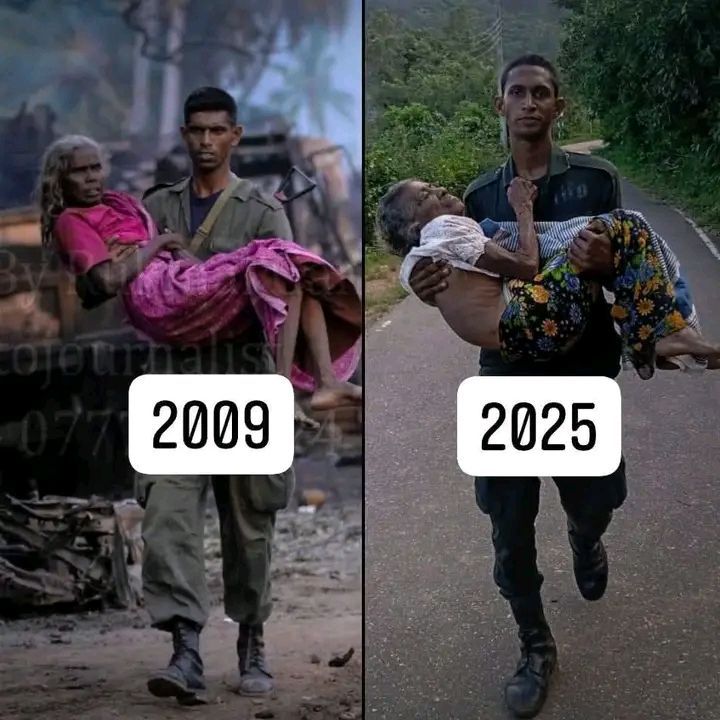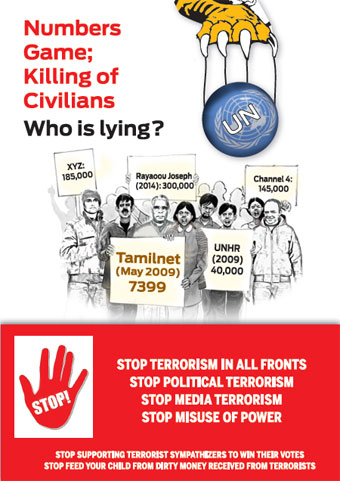Govt. flayed for implementation of Geneva recommendations
by Shamindra Ferdinando
(Courtesy of The Island)
President’s Counsel Manohara de Silva on Tuesday said they would even defend those who had been accused of perpetrating war crimes in courts established in accordance with the Geneva Resolution 30/1 in case their ongoing efforts to thwart the UN-led project failed.
PC de Silva said so in response to The Island query whether they would face the Geneva challenge if their initiative went awry. PC de Silva was speaking on behalf of Eliya (light), an organization consisting of professionals and academics, spearheaded by wartime Defence Secretary Gotabhaya Rajapaksa.
Ven Induragare Dharmarathane thera, retired Rear Admiral Sarath Weerasekera, and political columnist C.A. Chandraprema, also, addressed the media, on behalf of Eliya, at Hotel Nippon, Tuesday afternoon.
PC de Silva said: “We’ll do whatever it takes to thwart their project and, remain committed to defend those implicated in any type of court.”
Geneva Resolution, adopted on Oct 1, 2015, has recommended hybrid mechanism, comprising local and foreign judges. The government appointed Consultation Task Force for Reconciliation Mechanisms (CTFRM), too, has endorsed the Geneva Resolution 30/1 in respect of foreign judges.
PC de Silva, however, asserted that accountability mechanisms, comprising local and foreign judges, were unlikely to be set up here. Instead, the government was seeking to pave the way for the extradition of those against whom accusations were made, even in foreign courts.
The constitutional affairs expert claimed that the Office of Missing Persons (OMP) Act and Sri Lanka’s acceptance of the International Convention for the Protection of All Persons from Enforced Disappearances would facilitate the extradition of wanted Sri Lankans.
The OMP is the first of four specific mechanisms adopted by the Geneva Resolution, co-sponsored by Sri Lanka.Responding to another query by The Island, PC de Silva emphasised that the government was paving the way for Sri Lankans to be tried overseas, instead setting up accountability mechanisms here.
De Silva explained that the proposed constitutional is intended to abolish safeguards, afforded to Sri Lankans, in case foreign governments sought their extradition. The government was now seeking to do away with the privilege exercised by Sri Lankans to move court against their extradition, citing accusations were political, PC de Silva said.
The OMP and the International Convention for the Protection of All Persons from Enforced Disappearance were meant to ensure required legal measures to facilitate extradition process.
The Eliya spokesperson said abolition of the Prevention of Terrorism Act (PTA) would weaken the state security apparatus. The proposed constitutional changes, in accordance with the Geneva Resolution 30/1, could result in members of the security forces, and police, being subjected to legal action, at provincial level, PC de Silva said.
Declaring that the armed forces couldn’t be faulted for carrying out anti-terrorist offensives, in line with political decisions taken by the previous government, PC de Silva alleged that the government wanted the new law to override the Extradition Law.
The President’s Counsel also pointed out the discrepancy in the meaning of the word ‘arrest’, in the English and Sinhala texts. The lawyer alleged that the intentional discrepancy could result in a police officer, responsible for the arrest of a particular person, to be hauled up before war crimes for the subsequent disappearance of the latter for a different reason.
PC de Silva accused the government of committing a grave crime.
Both De Silva and Rear Admiral Weerasekera explained how the OMP Act could be abused by those wanting to humiliate Sri Lanka. They alleged that the government was working overtime to deprive Sri Lanka of a proper defence, at both local and foreign forums.
Alleging that every effort had been made to weaken Sri Lanka’s defence, the lawyer said the government couldn’t absolve itself of the responsibility for meekly accepting universal jurisdiction.
PC de Silva urged the Legal Draftsman Department, of the Justice Ministry, to confirm whether it had prepared or cleared the OMP Bill. If that department hadn’t done it, the country would like to know who actually prepared that severely inimical document.
The senior lawyer said members of parliament, who had backed the OMP Bill, were traitors, and those who would clear the way for the Disappearance Bill, too, were in the same category. PC de Silva recalled how the late Ven. Maduluwawe Sobitha declared, outside parliament, that those who didn’t vote for the 19 Amendment to the Constitution were traitors. “I would like to use the same expression on those pursuing anti-Sri Lanka agenda.”
Political columnist Chandraprema flayed the government for making a deliberate bid to deceive the masses by repeatedly claiming that the proposed International Convention, for the Protection of All Persons from Enforced Disappearances Bill, wouldn’t be retroactive.
Chandraprema explained how the proposed law, when taken with the present Constitution, could be utilized against those had been allegedly involved in past incidents. The columnist alleged President Maithripala Sirisena and PM Wickremesinghe of propagating blatant lies.
Another flaw was the proposed law could be applied to the armed forces only, Chandraprema said, pointing out that the Tamil community tends to categorized those who had been killed in battles as missing. The Island political commentator also pointed out that a large number of ex-LTTE cadres were living overseas, since the conclusion of the war, in May, 2009.
In his brief remarks, Chandraprema lashed out at the government for adopting the Disappearance Bill at the expense of various laws in place today. Alleging that the armed forces had never been harmed this way, Chandraprema pointed out that the servile government had also accepted that those extradited to a particular country could be handed to another country pursing war crimes allegations.
Ven Induragare Dharmarathana thera urged President Maithripala Sirisena to take tangible measures to ensure the Disappearance Bill would never be taken up in parliament.
The media was told how the government worked closely with a section of the international community to weaken the war-winning armed forces.
492 Viewers








